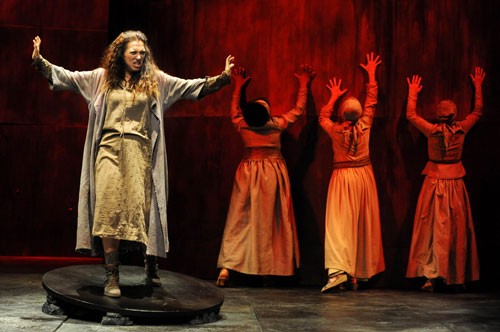Wednesday, October 26, 2011
Public Theater's Electra and Occupy Pittsburgh
It's not that I think people have changed that much. But what interests me about the art of antiquity is whether it's possible to relate to, or even fully comprehend, pictures and stories created in societies so different from our own.
Sophocles wrote this play about 410 BCE -- roughly contemporaneous with the construction of the Parthenon -- and the dialogue references myths, tales and historical figures centuries older still. The play's 2,400-year-old characters inhabit a cosmos of multiple and quite fickle living deities, one where fate depends partly on making appropriate offerings to the dead.
Indeed, theater itself even had a different purpose, more religious ritual than vehicle for personal expression.
Still, in Electra you can see theater as we understand it take shape. That's largely because Sophocles' Greece was more or less society as we understand it. Back then, no ship had yet crossed an open ocean, and telecommunication seemed less likely than telekinesis. Nonetheless, the royal palace of Mycenae is a setting where wealth, power, fame and privilege exist -- in ways they hadn't before the rise of civilization -- and sit at odds with justice.
At moments, the story resonates with current events.
In this staging, directed by the Public's Ted Pappas, Electra (intensely portrayed by Catherine Eaton) enters crawling; she's spent 20 years mourning her father, the king. He was slain by Electra's mother and her mother's scheming lover, now queen and king. Yet Electra is not driven by pure grief: Daily she must live with the flesh-and-blood reminders of the wicked deed. She wants justice, but isn't capable of claiming it herself.
Especially pointed is the relationship between Electra and her sister, Chrysothemis. Chrysothemis, dressed in flowing finery to Electra's rags, isn't any happier about their father's murder than is Electra. But she's accommodated herself to it. As Chrysothemis points out, it's simply easier to take the side of the powerful. "They are on the rise and we are sinking," she tells Electra. "Learn to give in."
Afterall, bending to power gets you nice things. And you can sleep inside, rather than outside, the castle walls.
Chrysothemis reminds me of the two suit-wearing young men walking to their office jobs Downtown this morning whom I overheard mocking the Occupy Pittsburgh protestors camped on Mellon Green.
Protest? Why bother? It's so much easier to just buy stuff.
Electra sees protest as her job. She's even under threat of exile and imprisonment.
Here, for sure, the analogy breaks down: Electra is royalty, after all, and desires not better government per se, but only the restoration of a rightful monarch. (She could, unlike most of us, be in the 1 percent, if she liked.)
Meanwhile, justice in Electra wants only the assassination of a couple of malefactors, as Electra's long-lost brother, Orestes, intends.
Compared to creating a more equitable global economy, that's kind of a snap.
Electra has seven more performances tonight through Sun., Oct. 30, at Pittsburgh Public Theater (www.ppt.org).
Tags: Program Notes , Image














